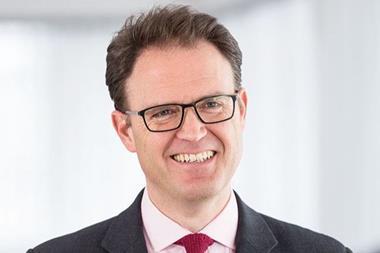Janine Cole, sustainability and social impact director at Great Portland Estates plc (GPE), and Sarah Ratcliffe, chief executive of Better Buildings Partnership (BBP), sat down with Andrew Teacher from Blackstock Consulting to discuss how the commercial real estate sector can champion sustainability in the latest episode of PropCast.
You can listen to this podcast via Apple Podcasts or Spotify or SoundCloud or listen to it through the player below:
“We need to go beyond the rhetoric,” Sarah Ratcliffe, BBP’s chief executive says days ahead of COP26. And she’s right. “What’s interesting about it,” says Janine Cole, GPE’s sustainability director, “is the focus on finance which obviously has a huge impact on real estate.” Cole goes on to discuss some of the complexities and challenges that the EU needs to address.
With the UN’s global climate change event imminent, the two industry leaders challenge head on some of the outdated elements they see as holding back progress, such as the inconsistencies around EPCs and the failure of some parts of the industry to look beyond a tick box approach.
One thing many experts are calling for is a proper market price for carbon that could directly incentivise change. But with the complex supply chains accompanying construction, this is still far from simple.
For GPE, which holds £2.5 billion of commercial assets across central London, a game changer has been setting its own internal carbon price. As Janine Cole explains: “What we found was that we would still have roughly 50 percent of our emissions left offset in 2030, even with our pretty challenging energy and carbon targets in place. We wanted to do something to drive the pace of change, and so we looked at an internal carbon price.”
“Once we reach practical completion, we will audit the embodied carbon and charge the internal carbon price”, she continues, “and then we also charge it on our operational carbon emissions. We actually went through a process with our sustainability committee of saying, do we just leave it on embodied carbon? The sustainability committee felt really strongly that actually, no, it should be applied to our operational emissions as well.”
Ratcliffe adds: “GPE and a number of our other members are doing this voluntarily at the moment to drive decision-making. One of the reasons they’re doing it is to manage the risk going forward, because there’s an open discussion there about whether a carbon price will be legislated for in the future.”
Pricing is set at £95 per tonne, one of the highest in the industry and over three times that of the EU’s trading system. Cole argues that pricing carbon properly is needed for it to make a real impact. “What we found is when we put the £95 per tonne through the development appraisal, it made a meaningful difference,” she says. “You need it to be of a certain level for it to actually drive a different decision.”
Key to driving this kind of sustainable thinking among commercial property owners has been the BBP’s Climate Commitment. The commitment requires its 27 signatories, drawn from the BBP’s membership of investors, landlords and developers, to produce a net zero carbon pathway.
After signing up to the commitment, calculating its carbon footprint proved surprising for GPE. “We found that only 15 percent of our carbon emissions could be directly controlled by us,” Cole reflected. “The rest of it came down to occupier emissions, the embodied carbon from our developments, ongoing use of the buildings from demolition, and a bit of corporate emissions. And we were shocked at how small that percentage is.”
Another challenge is how to avoid unintended consequences. As Cole explains, “If you define green as being an EPC-rated building, does that drive people to demolish buildings? Because by retrofitting, you may not be able to reach a B rating. So then if that drives people to do new builds, you’ve got much more embodied carbon.”
It is this embodied carbon, emitted through the construction process and a building’s physical materials, that GPE wants to tackle through a circular economy approach. For the investor and developer, “this is all about how you reuse elements of the building and keep it close to its original form.”
One of the developer’s current projects, 50 Finsbury Square, is a good example of this approach put to practice. “Though the development will feel like a new building,” Cole shares, “we’ve done things like retain the glazing. That’s massively reduced the embodied carbon, and by doing that we will have the first zero carbon building within our portfolio.”
You can listen to this podcast via Apple Podcasts or Spotify or SoundCloud or listen to it through the player above.
Previous Podcasts:
#107 The government must show leadership on building safety, says Network Homes
Apple | Spotify | SoundCloud
#106 PropCast: Co-locating homes and commercial space is prime for Londoners and Amazon deliveries
Apple | Spotify | SoundCloud
#105 Modern methods of construction are key to delivery of UK homes, say TopHat and Jo Cowen Architects
Apple | Spotify | SoundCloud
#104 Innovation in construction will require a joint effort from the public and private sectors, says Homes England and Modulous
Apple | Spotify | SoundCloud
#103 Argent’s bosses prefer curation to control
Apple | Spotify | SoundCloud
#102: ULI’s mentorship programme was a career-defining experience
Apple | Spotify | SoundCloud
#101: Soho’s John James has a legacy of supporting independents
Apple | Spotify | SoundCloud
#100: Grainger’s Helen Gordon on the resilience of build-to-rent
Apple | Spotify | SoundCloud
#99: Man Group and ilke Homes on the future of housebuilding
Apple | Spotify | SoundCloud
#98: Liz Peace, Sadie Morgan and Emma Cariaga on diversity and inclusion in the built environment
Apple | Spotify | SoundCloud
#97: Council partnerships are where developers can create social value, says Bruntwood chief
Apple | Spotify | SoundCloud
#96: New strata of “super prime” offices could arise from a pandemic, says BlackRock
Apple | Spotify | SoundCloud
#95: Eden Project’s Tim Smit discusses sustainability ahead of ULI UK Conference
Apple | SoundCloud | Spotify
#94: Evolution away from long leases creates opportunities for investors, says Ian Marcus
#93: Landlords must share risk and promote flexibility to revive high streets, says Shaftesbury boss
Apple | Spotify | SoundCloud






























No comments yet